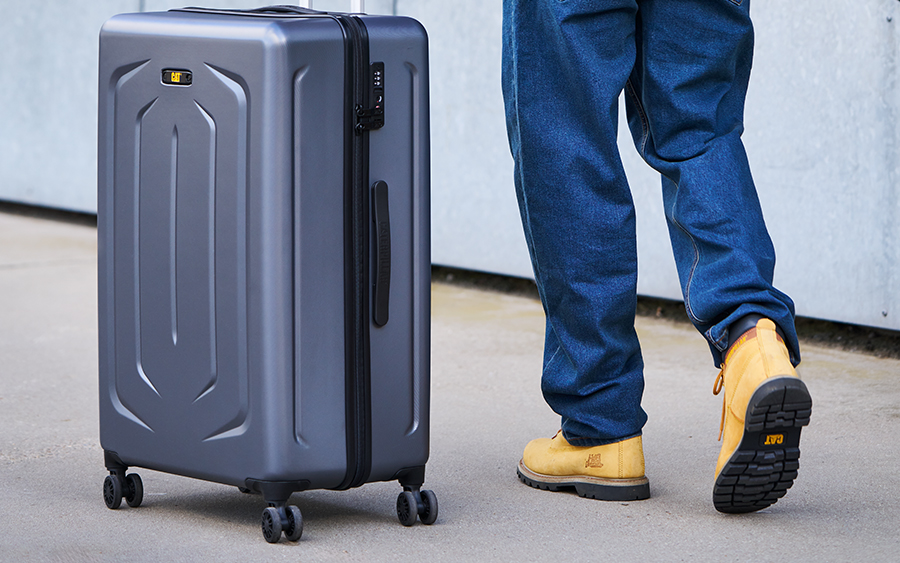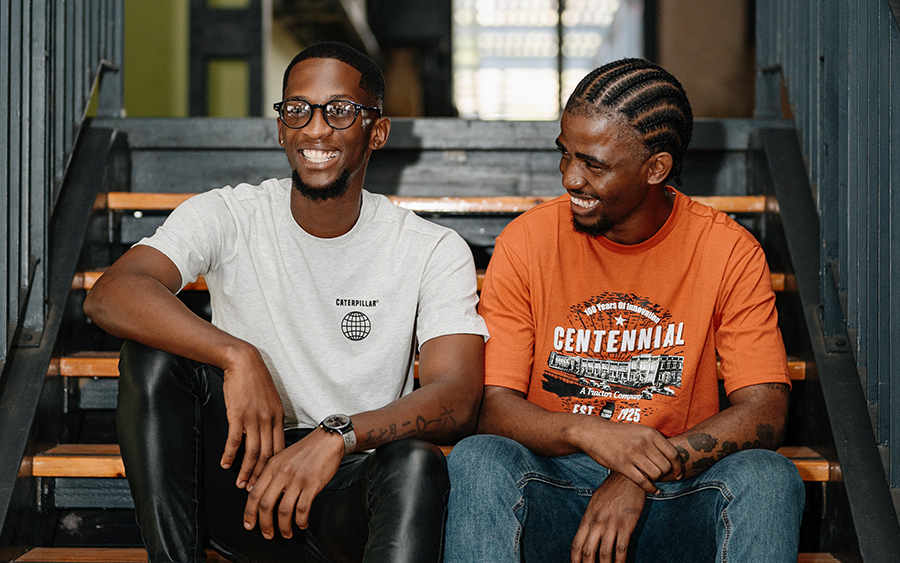Risktakers of the Month: Niall Cook & Craig Falconer

What do beer and Cat Footwear have in common?
“For more than two thousand years, beer has been the drink of choice for everyday, working-class people. If anything, then, beer symbolizes the virtues of ordinary, day-to-day life: friendship, loyalty, and unpretentiousness.”
– Thomas Standage, ‘A History of the World in Six Glasses’
In the same way, Cat Footwear offers the shoe of choice for those who need a shoe that works as hard as they do.
Richmond Hill Brewing Company (RHBC) in Port Elizabeth was founded in 2014 and has since grown into a bar known as the Tap Room, a venue for hire known as Chicky’s Yard, and one of the most successful and well-liked local microbreweries in town.
Just last month, the brewery took away two Silver awards and one Gold award at the African Beer Cup. And winning Gold in the Indian Pale Ale (IPA) category means that ‘Fever Dream’ by RHBC is the best IPA in Africa.
We caught up with the guys at RHBC to unpack how they get things done, how they have adapted to serve the community during the lockdown, and why they are such great Cat Footwear enthusiasts.

Niall Cook – Co-Owner, Director
Like Cat Footwear, co-owner Niall Cook knew how to merge work and play as he curated this iconic local brand and its beers to grow it into what it is today.
How did it all begin, and what is your current role?
So I had to do something for school where we had to use yeast. Everyone was making bread and I wasn’t too keen on the idea because I didn’t want to make another loaf of bread. But a friend of mine’s dad, Kevin, had a little brewery in their back garden. I was sixteen at the time, and I said to Kevin, “Do you mind showing me how to make some beer for school?” and he agreed!
So I made 2 litres of beer for school and it was really cool. I enjoyed the whole process. I enjoyed all the technical aspects of making beer and the artistic flurry that you can put into it with designing the recipes and that kind of stuff. So from that, it kind of just snowballed.
I studied Molecular Biology with the idea to have some sort of background if I wanted to go further into brewing beer. After I did my Honours, I was actually completely over research, I hated it at the end, and I had some money saved up from some bursaries. So I used that money to get to Ireland, where I worked in a brewery called Metal Man for a couple of months. It’s probably where I learnt most of the trade. It was a very similar brewery to what we’ve got here at the moment – same size, same kind of concept, on- and off-site with sale consumption, that kind of thing. And then from there, I went to Germany and worked at a couple of little brew houses and restaurant-oriented breweries.
After I finished up there, I came back to Port Elizabeth and met Matt Repton, my business partner, within two weeks – it was actually just perfect timing.
He had a small brewery that was looking for someone to brew on and I got hold of him and we started working together. We started developing a recipe which was ‘Car Park John’, and then from there it just kind of continued to where we are right now.
So the whole arrangement has been essentially building the business from the foundation, myself and Matt, to where we are right now.
So my current role is everything. [chuckles]
What do you love the most about your job?
I think I love the fact that I’m not working. I don’t get here ‘going to work’, unless things are like going really pear-shaped – which does happen every now and then, it has to go pear-shaped – but for the most part it doesn’t. And I enjoy what I’m doing. I get to innovate and create new products and get people to drink them and enjoy it and it’s very rewarding on that side of things.
What are you top priorities when you are brewing a beer?
With a classic beer like ‘Car Park John’, there has obviously been years and years of tweaking the recipe. You’re always tweaking the recipe, because your ingredients change slightly and you need to go back to it and keep tweaking it. It’s all about consistency – making sure that all our ingredients are high quality.
Then the other side of the coin is when we’re doing our seasonal beers – every month we try and have a once-off beer where we get a really cool label, collaborate with artists like Joff or Ashley Reid, local artists, local graphic designers. And those beers are all about excess.
It’s taking a ridiculous amount of ingredients, not holding back, not thinking about trying to make a beer that’s cost-effective and sustainable. But the thing is it’s a beer that’s got a lot of passion that’s gone into it, and there are a lot of ingredients that go into it – and so you get what you put into it.
It’s only 1000 litres at a time, 2000 odd cans, and once it’s gone, it’s gone! So it’s essentially a once-off thing, we’re working on the whole novelty of it, the whole limited release. That’s where you can really start playing, because I mean we’re brewing ‘Car Park John’ 5-6 times a week. It’s nice to do something other than ‘Car Park John’.
What is your favourite beer in your product line or the one you’re the proudest of?
It obviously always changes. It’s normally one of the newer beers that we’ve been working on. However I think at the moment it’s ‘Stay Present’, which is a West Coast IPA. A very, very hoppy beer, nice robust bitterness – high alcohol content, but it’s balanced quite well so that you don’t actually taste the alcohol. It’s just like a big fruit bomb.
What is one of the biggest life lessons you’ve learnt in the processes of brewing beer?
I think maybe that you can’t control everything. I mean, you try your best to make sure everything is perfect every single time, but unfortunately it’s never the case. There’s always going be something that can go wrong, and I think it’s about being able to adapt to those issues and adapt to them quickly so that you don’t lose money. It’s also about being quite creative in that sense to try and see what you can do to minimise your losses.
I mean, if you had a big commercial brewery and a batch of beer goes off and you need to dump it or something like that, it can be absorbed. Whereas if something goes wrong on us, we are small-scale – we lose a batch of beer or something like that and it could be heart-breaking for us.
So it’s about ensuring that we don’t do that, but if something like that happens, being able to spin it without compromising on what we are putting out there. It would be like, for example, instead of dumping the beer, maybe we can partner with someone and distil the beer to turn it into a product that we could resell with the gin that we produce.
Why do you need a good-quality shoe in your daily duties, and why have you chosen to wear Cat Footwear for that?
My other pair of Cats are steel-toe. So I mean we are lugging kegs around all over the place and I have dropped them a number of times on my feet, but it’s fine because I’ve got the steel-toe. So that’s one big reason why. Obviously it’s a very wet environment, and the leather always helps to repel the water.
But I think for me Cats are always comfortable and very sturdy, especially the ankle-high ones giving that support so you don’t twist your ankle or slip on the floor or something like that. It is an industrial environment, so you need something that’s hardy.
I go through shoes quickly, but I don’t have to go through Cats quickly – they always last.
What made you choose the Cat Groundwork WP as your latest pair?
Well it’s something that’s a little bit more casual. I’m not working in the brewery hands-on as much now, I’m spending more time with regards to pushing the brand with the Tap Room and events and all of those types of things. So I can use these shoes in that sense – it’s a little bit less serious of a shoe, although it’s actually more formal.

Niall Cook holding the Silver and Gold Awards won at the 2021 African Beer Cup.

Craig Falconer – Admin Manager, Home Brewer
Craig’s story is the true story of grit, resilience and patience – everything it takes both to brew a beer and to start a career.
What is your role at RHBC?
My current role can basically be summed up as Admin Manager. I manage all the administration for the business in terms of sorting out the invoices and logistics to get local restaurants their stock of our products.
But it extends a little bit further than that. I also get all the web store orders together when people order our products online. I get emailed the order and then I have to work out the logistics to get it to them and things like that. There’s also other general stuff as well, like when people want to make bookings for beer tastings or gin tastings it comes through me, too. I also allocate payments, send out statements, stuff like that.
And in terms of brewing?
Home brewing is a hobby for me. But if they need help in the brewery with something then, I do jump in.
It actually took me maybe a year of working here before I decided to start home brewing beer. It took a year of just asking Niall questions over time and understanding the process of brewing beer before I actually invested in my own equipment to actually do it from home. And from that moment, it became a passion of mine.
How did you get to where you are now with the brewery?
That’s a good story – although it also might be a bit of long story! [laughing]
So starting at the very beginning, after I finished school I went to study a BSc and it went on for a few years, but I couldn’t quite make a success of it. So in the end I left the university and for a couple of months I was just working odd jobs here and there that I could find, mostly bartending jobs though. And one of the old managers here said, “Hey Craig, would you like to pick up a couple of training shifts at RHBC?” and I thought I’d see how it is.
Very quickly I recognised that this was a company that has potential for growth, and since my studies didn’t work out and I needed a job and I wanted to build something for myself, I thought that maybe I could grow with the company.
So over time, I worked towards showing Niall and the others that I am reliable, hardworking and trustworthy, and over time he started giving me more responsibility. It started very basic, with just doing the shift list once a week. Then it moved on to other things like cash-up and stock orders. So over about a year of just adding small responsibilities like that it became a bar manager position. And that was going well – it must have been about a year and a half maybe that I was managing the bar. And then of course the pandemic happened so I wasn’t necessarily a bar manager anymore because there wasn’t a bar to manage! [laughing]
But around May last year, I was offered a position that involved being more in the office, which I took. It was good to move away from the bar and I wanted to see where this position would go – and here I am now.
Bottom line though, if someone like me can prove to themselves and to others that it’s worth it in the long run to keep going through the difficult times, it doesn’t really matter the pace at which you go, as long as you get there. And I have been incredibly lucky that, that was seen and recognised.
What is the most challenging part about your job?
Maybe not a challenging part, but a difficult aspect is that admin has no end. [laughing].
If we’re going to talk business-wise, with me being involved in the admin side and sending stock out and managing payments though, it is quite difficult to see people struggling. Not just yourselves, but other restaurants, too, because of the pandemic and the lower numbers. So seeing that and balancing that aspect of the business can be quite challenging.
What do you love the most about your job?
Just about everything, actually! It’s the whole vibe, it’s the people that we see here – I’m a big people person so that is a very important part for me. I love people, talking to them, communicating and forming relationships. And one of the other things that I’ve really enjoyed would be our home brewing project called the RHBC Wort Challenge.
It was formed during the lockdown as a way to adapt as a business and it’s great because we started to share the passion of the whole beer brewing process and it grew fantastically. The whole project is run through a couple of WhatsApp groups that I manage and each of them average around 200 people. I remember the very first batch that we did was August last year and we’re still going strong.
Like for the batch coming up this weekend, I’m sitting on 1 400 litres that people have ordered. So it’s great because we get to experiment with different types of beers without too much risk involved. We brew a very different beer, people take it home in their little fermenters and give us feedback on it. Compare that with doing 1 000 litres of a beer and it not being too popular.
What is your favourite beer in your line or the one you’re the proudest of?
That’s an easy one – ‘Two Rand Man’, the Irish red ale. The reason I like it so much is because it’s a purely nitrogen-based beer, so that means it’s not as fizzy and highly carbonated. In fact, it’s very, very smooth. I love it – it’s hands-down my favourite beer.
What is one of the biggest life lessons you’ve learnt in the processes of brewing beer and being involved?
The thing that’s had the biggest impact on my life goes back to what I said earlier about how it doesn’t matter the pace at which you move, as long as you keep going. I only learnt that through my time here.
My studies didn’t work out for various reasons. I have learning difficulties and for someone like me with those difficulties, it’s not easy to find success. But through my work here and through everything that I’ve learnt through university and especially the scouts (that’s sort of my outdoor hobby), you just have to keep going. I would like to put the message out there to others with the same sort of difficulties to not give up. If I can find a way, I’m sure others can, too.
There’s a parallel with brewing beer here – how long does it take to brew a keg?
On average, from the very first step, a month – and thirty minutes to drink it! [laughing]
But it requires patience, beer. You’ve got to treat it like a living thing – you take care of it and it’ll take care of you.
Why do you need a good-quality shoe in your daily duties?
The brewery is quite a harsh environment, and there is a lot of water involved. I mean, if you take a look at the floor, there’s consistently water everywhere. There are also certain chemicals that we use for cleaning in the brewery that can be quite harsh. There are a lot of things that go on in the brewery – lifting heavy things, moving and dealing with large equipment, etc. So you need shoes that can handle that and that environment, and that are comfortable.
It helps to have waterproof, hard-wearing, hard-working shoes. Otherwise, I mean, some time ago I used to only wear tekkies, and they were destroyed within a month!
You previously had the Cat Holton Steel-Toe and now that you’ve changed to the Cat Fairbanks Chelsea – how are they doing?
They’re a solid pair and I’ve still got them at home.
But this, the Fairbanks Chelsea, is awesome. They are very, very comfortable! I love the thick heels, that they’re warm and completely slip resistant. I also very much like the clean look with me going from laced to a slip-on. They’re really great.

Products from left Groundwork WP and
Fairbanks Chelsea.
If any brewery matched up to our motto of #DoMore it would be RHBC. Always pushing the envelope for empowerment and sustainability, they do more every day.
- They #DoMore than just beer – they produce an array of craft beverages from a hard lemonade to gin and more.
- They #DoMore than make their own beer – they created home brewing kits for customers to take home and have a hand at brewing during the lockdown.
- They #DoMore than selling beer for profit – they converted their equipment and started a soup kitchen when the lockdown began to affect poorer communities, making over 30 000 litres of soup (100 000 servings) for those in need.
- They #DoMore than commercial branding – they use local artists to design the labels of all of their new beers.
- They #DoMore than use natural resources in their processes – they use reverse-osmosis water for their cleaning needs.
- They #DoMore than packaging their beers with plastic – they use bio-degradable plastic to shrink-wrap their deliveries.
- They #DoMore than drinks – they now make and sell traditional hand-stretched mozzarella, too.
Inspired by Niall and Craig and the RHBC?
Get Niall’s look with the Groundwork WP or get Craig’s look with the Fairbanks Chelsea.
Either way, you can get the look and feel that you need to #DoMore and brew the life you want with Cat Footwear.






